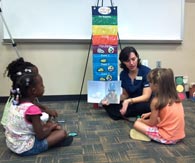Funding helps students with language, reading challenges.
August 9, 2013

New grants to Dr. Suzanne
Adlof will fund studies to
improve literacy
among youth.
For many students, reading is not fun. It can be hard work and fraught with frustration.
More than a few will fall below the achievement levels needed to succeed for their grade.
Two grants totaling more than $1.9 million, awarded to Dr. Suzanne Adlof of the Arnold School of Public Health, will support her research program on the early identification of language and reading difficulties and the development of effective interventions to remediate those problems.
The Institute of Education Sciences at the U.S. Department of Education awarded Adlof a three-year grant of nearly $1.5 million to develop an "online tutor" program aimed at accelerating vocabulary acquisition among high school students.
A three-year grant of $435,744 from the National Institutes of Health will examine specific language impairment (SLI) and dyslexia in second-grade children. SLI affects more than 7 percent of U.S. children and is associated with an increased risk of academic and work-related problems. Dyslexia is estimated to affect between 5 – 10 percent of U.S. children.
Adlof also is one of the lead investigators on a program, Get Ready to Read with Cocky, funded by a $95,000 grant from the Central Carolina Community Foundation. (See related article this page.)
"These grants provide an exciting opportunity to enhance our research on language development and develop programs that will make a difference in students' ability to learn," said Adlof, director of the S.C. Research on Language and Literacy Lab (SCROLL) and a faculty member in the Department of Communication Sciences and Disorders.
The grant from the U.S. Department of Education will enable Adlof and her colleagues at the University of Pittsburgh and Carnegie Mellon University to develop, refine and test the effectiveness of computer software that will enhance high school students' vocabulary knowledge.
Vocabulary knowledge is one of the best predictors of success across academic disciplines. "Sadly, there is increasing concern among experts that many high school students' vocabulary and literacy skills are insufficient for college coursework or career requirements," said Adlof. "The problem is made worse by the lack of research and resources available for high school vocabulary instruction."
According to data from the National KIDS COUNT, 25 percent of eighth-grade students, who are only one year away from high school, are below the reading achievement levels for their grade, and 68 percent of these students are below proficient levels.
The technology will address the varying stages of students' abilities. "This new software will deliver individualized instruction to enable students to learn at their own skill level and across all academic disciplines," she said. "Additionally, we are building in adaptive review features that will help students retain the information that is taught -- a critical piece that is often missing from traditional vocabulary instruction."
The web-based program will assess initial and developing word knowledge, provide vocabulary instruction and an adaptive review schedule, and offer interactive activities that encourage students to use and enjoy the intervention.
The program will be tested with public and private high school students in Pennsylvania, South Carolina and Texas and will include a diverse student population.
The NIH award from the National Institute on Deafness and Other Communication Disorders will fund research to study word learning difficulties among young children with reading and/or language impairments. "The nature of this difficulty is poorly understood," Adlof said.
One of the problems is believed to be phonological memory, the ability to recall verbal information, which is often difficult for children with reading and language problems. Semantic processing deficits—difficulties processing meaningful information about a word—also could be a factor for word learning problems. "While there is some evidence for each proposal, previous studies have yielded mixed results, and different underlying causes might require qualitatively different kinds of treatment" Adlof said. "Thus, there is a critical need to understand the relative contributions of phonological and semantic deficits to word learning in these populations."
"Our long-term goal is to develop more effective assessments and better-targeted interventions for SLI, which would have a strong positive impact on public health outcomes," she said.
The NIH study is timely. The S.C. Readiness Assessment in 2008 found that teachers rated one-quarter of kindergarten and first-grade students consistently did not have the reading and writing skills necessary for their education. The Stanford Reading First tests in the fall of first grade found that only 20 percent of students in high-poverty schools have reading skills at grade level and that 54 percent need substantial intervention.



_01.jpg)
_02.jpg)
